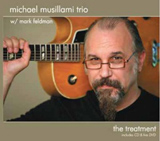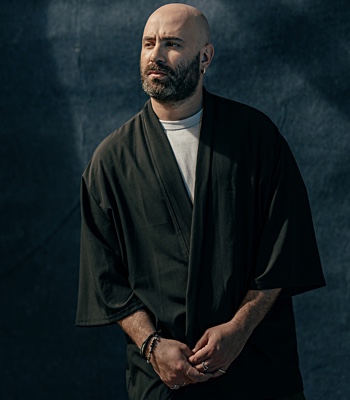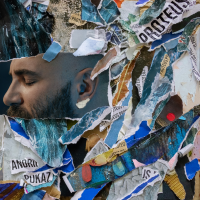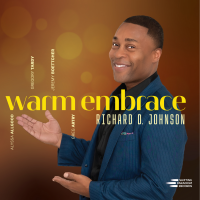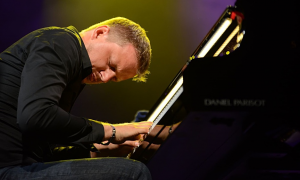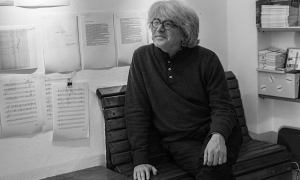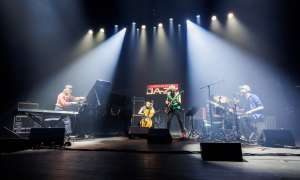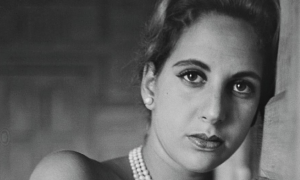Home » Jazz Articles » Interview » David Torn: A Lifetime of Improvisation in Non-Improvisa...
David Torn: A Lifetime of Improvisation in Non-Improvisational Settings
I have come to understand that what my personality needs is to not worry about idiom or pigeonholes or labels. To really, really not worry about it, and just try to pursue a voice. There are rock players, and there are jazz players--and I
Certainly Torn's a guitarist of humbling technique—but he's always been more interested in texture and sound than the kind of electric shredding beloved in guitar-hero-worshiping circles. Torn studied composition with Leonard Bernstein and guitar with John Abercrombie and Pat Martino. It was during his tenure as guitarist with the New York-based Everyman Band—a group originally formed to support rock artist Lou Reed—that Torn's unusual, processed electric textures and highly original approach began to get noticed—and this attention only grew with the releases of two ECM recordings under his own name, Best Laid Plans (1985) and Cloud About Mercury (1987).
Torn parted ways with ECM, but has continued to release excellent records such as the 1996 solo CD What Means Solid, Traveller? (CMP) and the electronics-saturated 2000 release under his Splattercell moniker, OAH. But other activities have come to fill his time. He's worked as a session musician for countless artists such as David Bowie, Tori Amos, John Legend and David Sylvian; he's played on many film soundtracks as well. Currently a large part of his time is spent actually composing for motion pictures, which he calls his true love and ambition.
One can't fail to mention Torn's simultaneous career as a recording producer, mixer and writer. His fascinating, rich mixing has deeply enhanced such modern jazz classics as Drew Gress's 2005 CD 7 Black Butterflies and Dave Douglas' Keystone (also from 2005). He has done invaluable post-recording work for his great friend and collaborator altoist/composer Tim Berne—there are so many Berne recordings that, as a result of Torn's meticulous mixing, sound great despite their hardscrabble recorded origins. Oh, and he's written a big hit for Madonna.
But it was at Berne's insistence that Torn returned to live performance. His new CD on ECM, Prezens, is an amazing recording that sounds like nothing else out there and stands up to dozens of listenings. I telephoned Torn at his Pasadena home and we spoke about, well, everything.
Pasadena, the Film World and Being Itinerant
David Torn: I wish I had my cats here. I'm currently extremely bachelorized and working really, really long hours every day for the last nine weeks.
All About Jazz: What are you working on?
DT: I'm working on a film. I've been bouncing back and forth from New York to California with no quarter on either end of the stick. I fly to New York in a hurry to do something and get back to California as fast as I can. Then, when I go back to New York, I have to be there as soon as possible, and all this gear has to move, and it's pretty daunting. And I don't have my animals here, not to mention family, which is a whole other story. But not having the animals around when you're alone is really rough, I think. I told my wife I'm going to get a big stuffed dog to put in the house [laughing].
AAJ: Right. You don't need flesh and blood; you just need fuzziness.
DT: In any case, there is a camaraderie that exists between humans and animals that is irreplaceable. I miss my animals. But I am going to go home for a day, just 24 hours, because I need to. I need warm human beings and animals around.
AAJ: Where are you now?
DT: I'm in Pasadena. I live in Pasadena now. It is a huge difference from L.A. There are very few Hollywood people out here—it's green; there are neighborhoods. My neighborhood is a walking neighborhood—you can walk around, walk to the store. And yet I can get to the studios in 15 minutes tops, and it might take me 50 minutes to get all the way to the West Side where [laughing] all the shit is happenin'!
For the people that live and work in L.A., if you say "Pasadena, you might as well say "another planet. People have very strange attitudes of place here. I have a lot of friends here, and there are a lot of people I dig here, but the whole of western Los Angeles County is colored by—I don't know what it's colored by. It's just weird. And some people really think that if you moved to Pasadena, you must not want to work anymore. But it's really close!
AAJ: Do people really think that way when it comes to hiring talent? Just how close they are?
DT: I have to say that access to meetings is, in fact, why I'm here. For years, I've been saying to this film agent or whoever, "Hey, I have a busy schedule, but if you get me a meeting with a director who is definitely worth meeting, I'll be there. Give me three to six hours notice, and I'll get on a plane and I'll be there as soon as the plane arrives. I can be there that same day or the following morning.
And it never frickin' worked. Ever! So at the end of last year, I decided I'd figure out how to do this bicoastal thing. So we moved to this place in Pasadena in March, and it all changed. I would never have gotten this meeting had I not been here, for the film I'm currently working on—which is currently driving me crazy, but that's the way the game goes. They never would have done it. "Can you meet tomorrow? "Yes. Where? "Santa Monica. 9:00 in the morning. "Yes, I'll be there. Had I been in New York, I could have easily done the same thing, so I don't know why it is—but I wouldn't have gotten the meeting. It's very strange. This film thing is a very strange business.
AAJ: And it's not like you can reason with them. You just had to move.
DT: Yes. I had to show something—my willingness to be in it. Of course, it seems that when you move to one place, you end up getting some job on the other part of the world. I think no matter what you do in music, it seems like there is bound to be some kind of strong focus on itinerancy. You will be itinerant at some point in your life, having made the commitment to be a musician, whether as a performer, a composer, whatever. You're going to be moving around a lot.
I guess I've always struggled with that, and now I have a place—my real home out East—that I will never, ever sell, unless I'm destitute or the world falls apart. And as much as I am loath to admit it, that's my home. It's hard for musicians to admit that they have a place, a geographical location. "Where are you from? "I'm from New York.
AAJ: Just having a shack somewhere that you can go and get drunk in once a year is very, very important. And the absence of that rootedness can make you crazy.
DT: Yes, and I think that modern culture sort of denies that. The amount of movement and the lack of, let's call it familial home in America, have been amplified to a greater degree than in any major civilization. If you look at the numbers of people who move for their jobs constantly and don't ever get that familial home—I know because I come from a family that never had homes. I come from itinerant stock.
My wife is a mixture of Native American peoples and some other stuff, but the Iroquois and Cherokee lines are very predominant, and she's very attached to geographical locations. I don't use the term "spiritual much, but there is something remarkably different about that. And it made me realize that there are people who actually become attached to place. It kind of blew my mind—it actually took something like 20 years of it perpetually blowing my mind before I realized that I want that too. But that's something very strange about post-European culture: We don't attach ourselves to, say, the lake we live next to.
Returning to Playing Live and to ECM
AAJ: You have a brand new recording under your own name, Prezens, which is your first on the ECM label since the 1980s. I think this is going to be my favorite record of the year, and I think it's your best album yet. This is your first since your Splattercell recording project in 2000, and the first under your own name since your solo record What Means Solid, Traveller? from 1996.
Before we talk about the music, tell me why you made your first record in many years, and how you ended up back on ECM. Was the music made for them, or did you just hand them a record you'd done and finished yourself?
DT: I made a record because [altoist/composer] Tim Berne has been busting my ass since 2000. And he and I are really, really good friends, and we spend a fair amount of working time together. We became incredibly good friends probably around '97 or '98. We don't live near each other, but we did a lot of work together and we got really tight. God bless him, he continues to bust my ass about not being a performer. For that Splattercell record [OAH, Cell Division, 2000]—when I made that record, I thought, "Okay, I'm going to try one more time to make a record that I like and see if I can maintain a relationship with a label and not get screwed.
And [laughing] it didn't really work. I didn't get as screwed as I had been in the past since I left ECM, but I have been just beleaguered by the recording, and live performing and touring things. I can't handle it. You put so much into this stuff, and touring is so hard, and I have other skills and other interests to pursue. Really, everything in America conspires against the musician, to make musicians not able to perform in their own country and not be able to sell records that are not of the mainstream—not without making sacrifices that I was no longer willing to make.
But there was Tim busting my ass, and it kind of coincided with something else that was happening a couple years into our relationship. I did a score—I'm going to cross subjects here. Around 2003, I did my first real studio picture, on my own, not as a session player, not helping somebody else out, not addending [sic] someone else's score, but doing my own. That was a film called The Order. And accidentally, [ECM label head/producer] Manfred Eicher, or someone at ECM, heard the score before the film was released. I don't know how that occurred, but it was a good several months before the film came out.
So I got a call from ECM saying Manfred had heard the score from The Order and wanted to know whom to contact to put the score out. That was a mixture of a small orchestra with some strange instruments, voices, some of my instrumentation, and electronics. He wanted to put it out as a record, but he was incapable of getting it from 20th Century-Fox, who owned the materials once they had paid for the score.
AAJ: And who probably had no intention of releasing the music themselves.
DT: No, they did. I had told the vice president of music at Fox, "Don't make a deal without talking to me, because I know a lot of people in the record industry. And Manfred was a little bit late in coming to them, and they—without telling me, because they don't need to—had already made a deal to release the music. It was released, and it's still in release.
So Manfred couldn't get that score, and he was frustrated. So he had someone at ECM call me and say, "Do you want to talk to Manfred? So we spoke, and the conversations with Manny were very, very pleasant; it was like all bygones were bygones, and here we were in the present, and let's do something together.
So I told him, "What I'd really like to do is be able to continue the movement of writing for mixed orchestras, something for the ECM New Series [the label's series concentrating on serious composition, both early and contemporary]. And he was like, "Oh, definitely. We can definitely do this. He wanted some more material, anything I'd recorded. I said, "Well, I only have demos of orchestra material, and if I send you notation, you can't read it. But he was really positive.
Now, at this time, I was working a lot with Tim, and Tim and I had begun playing these improvised gigs. At his insistence. I did a gig with him and [drummer] Bobby Previte. I'd also begun to work with Tim in the studio on a pretty regular basis. He makes a lot of records, and Tim's records are often truly records in that they are live performances that sound terrible, and it was always my job to make them sound good.
AAJ: That is a job at which you have succeeded.
DT: Thank you, sir. Now a conversation with Manfred Eicher is something that goes on for some period of time. It's not like we make a decision in one hour that on August 22nd, 2005, we will do a recording. It's not like that; it's a process and people's schedules change and you have to be flexible. And in the middle of this waiting period with Manfred, Tim and I—again, at Tim's insistence—began playing a lot together.
And I was having an absolute fucking blast. I only had one rule: I only wanted to do pure improvisation in front of an audience. I didn't want to do tunes. I sat in front of a computer all day rewriting other people's tunes, writing my own pieces of music, organizing things. I just wanted to play with people who wanted to play.
And this group began to slowly grow out of Tim's group [drummer Tim Rainey, keyboardist Craig Taborn, and Berne work together as Berne's band Hard Cell]. So here I was talking about this orchestral record and how daunting that would be. So I thought, "Hey, why don't I make a record that's like what we're doing? I think there was some point where this band got together, played a gig or two, and it was just unbelievably fun. And besides being fun, it felt amazing. We played at the 55 Bar.
AAJ: Oh, the world's best club.
DT: No, the Tea Lounge in Brooklyn is the world's best club.
AAJ: Well, world's second-best, then.
DT: Well, yeah. And there's a great place in Montreal, too. So we played this gig, and I listened to the live recordings, and Tim and I starting talking, and I said, "I'm going to try to shift this recording project over to a band. So I got back to Manfred and said, "Why don't we hold off on this stuff? I've got this band, and you should definitely hear it.
So I sent him some tracks. I mastered the really terrible-sounding live tracks from the first and second gigs we played. I picked nine or ten contiguous minutes, four or five of those ten-minute sections from four or five different sets, and didn't do any doctoring of the material at all. And Manfred said, "Absolutely. Yeah, go ahead.
I said, "I'd like to do the record here, either live in a club or maybe in the studio. He said, "However you want to do it. Why don't you just make the record? Just start making it, and as you're making it, send me a piece or two. Which I did. So, as they say in Hollywood, it had been "green-lighted [laughing], and it just proceeded from there. It took a few years to kind of figure it out—I was just really fishing.
And Manfred and I would talk on the phone: "It's kind of amazing that we're getting back together after 20 years. It felt really natural to me. Here's a guy who, whatever his output has been since, absolutely earned my undying respect in 1973 or 1974. Whenever. And he's still putting out records that blow my mind—especially the New Series for me. Have you heard the Tigran Mansurian string quartets? Unbelievable stuff.
So it felt really natural and, yes, I ended up making the record myself. For Manfred and for the band and for myself, I took my time with the material. We recorded everything on the record—all the band material—in two-and-a-half days in a studio in upstate New York. It was great fun, although a very different vibe from the band live, because there's no audience to interact with, and the energy and environment are different. It's not a live improviser's environment. It's a studio. You don't feel people; you don't feel a room.
I had chosen a room, for myself, that had some amount of separation, but was a big room so that I would be able to ditz around with some of the material in the studio a little more easily, if I wanted to do that. So it was a different environment, but we got an incredible amount of material. I think we recorded something like ten hours of material, and it was the dauntingest task of all time to go through this material and decide what I was going to choose from it to work on.
I did three pieces, including one piece that was completely live. I think I did some overdubs myself at the end of it from a club date that we had done. So I sent those three pieces, handed them to the band, and said, "Tell me what you think. Two were the band, and the other became track two of this record ["Rest & Unrest ]. I married the pieces together, kind of made a little movie, made it float together well. And the band loved it, and Eicher loved it. And then I just finished the record—again, in a very long time, because of the choosing of the material.
Prezens Is a Real-Time Recording, Mostly
AAJ: This CD is ostensibly a quartet set, but quartet or not, I think we can agree that this is not Cloud About Mercury, part two. Like that 1987 ECM record of yours, this a very guitar-driven record—even when the guitar doesn't sound like a guitar—but it probably has the most in common with recent stuff you've done like Splattercell or your solo stuff, although I think it's really its own animal.
I hear live performances in here—lots of Tim, plenty of Tom, maybe less Craig—but anything seems cut up, rearranged, and sonically altered; there's not a completely natural ambience to anything on this record. Yet I assume there was plenty of the group playing together at the same time. Certainly I hear what sounds like a group improv in the middle of "Neck Deep in the Harrow.
DT: Well, all of "Neck Deep in the Harrow is a group improv. And this is something that I've had a very hard time explaining to people, and I don't know why this is. But the bulk of the material that is the band is not really altered very much beyond what we did [laughing]. There are places in it where I would choose to do a little overdub myself, but most of it is just the band playing together.
Oh, but just to step backward one step—Craig played relatively shyly in the studio, for some reason. And that is kind of the nature of improvisation: You just never know who's going to take the fore. I played a lot less guitar in the improvisations than often happens on the live gigs, for exactly the same reasons—the environment was different.
But I can tell you off the bat that on "AK and "Structural Functions of Prezens, the improvs have absolute integrity with what was played in the studio. There's much more integrity to the stuff than you may have thought.
The thing that's beautiful about this band is that it's four improvisers who share a very similar kind of—I won't say "nonidiomatic but I would say "a-idiomatic —preferences. We share resonances because of these preferences, and we have the ability to communicate and develop a vocabulary of communication. And everyone is capable of doing improvs that are, in fact, compositional.
And that's why I wanted to record the band doing improv, because there is this remarkable ability in this band to kind of turn on a stylistic dime and make those transitions with a grace and naturalness that is unlike any other improvising band I'd ever been in. Maybe it seems so unlike anything else because I find it so compositionally pleasing. And I'm not guiding the improvs in any way other than being a member of the band.
This is a tough thing to explain about this record, because there are pure improvs where I've done some overdubs. And I've definitely altered things sonically. But I also do that live! A part of the improv setting is that I'm sampling people while they're playing; that's part of my schtick, as it were. I have a setup where I'm not only playing guitar, but I'm also heavily processing Tim. And in the studio, I set it up so I could process everybody in real time—and print the results to separate tracks.
AAJ: Oh, I see. So everyone is perfectly separated—or much more separated than it could have been.
DT: More than in a club, anyway. I always have it set up so I have a little mixer, and that mixer feeds the same sampling devices that my guitar goes into, so I can mix samples together. For example, I can make a guitar loop and then grab one note from Tim—or five notes, or ten notes—then throw them into the mixer, and they all spit out of these guitar amplifiers.
And so the sound of this record is the sound of the band! "AK, "Structural Functions of Prezens, "Sink, "Neck Deep in the Harrow and "Transmit Regardless are really pure band tracks. "Ever More Other is me, Tom and Craig, but I did add a bunch to that, so that's different.
And I did fuck around with shit in the studio. But that's what I do as a producer! But I am trying to put across that I'm not altering the integrity of what the band played. That is something I'm pretty sensitive to. Every once in a while, in the middle of a purely improvised piece, something sounds maybe a little "studio-ized. And that might have been the case, or it might have been something I did live.
I felt very nervous before the record came out about this very point—because reviewers who don't do their homework, or don't talk to me, are going to get a wrong impression about the band. And the fact that I actually inserted other pieces made from the same materials on the same record is because the record was coming out under my own name, and I wanted a little something else.
Like "Them Buried Standing —that piece, that's guitar, keyboards and drums, that little fake jazz piece. I did that after the fact with some drums that Tom played in the studio during a warm-up session. I felt, after the fact of the recording, that there was never a point where the guitar was playing a kind of featured melodic role—so I wrote a piece of music. I did this little improv, I really liked it, and then I found these drums of Tom's from the session, just him warming up, and put that piece together myself.
Then I began to really doubt myself, doubt that I did such a thing, because I don't want people to misperceive anything. The remixing, the Fripperies, the tricks are not quite what a lot of reviewers have made them out to be. When you see this band live, it's much more powerful than this record is [laughing]. It really is an unbelievably strange experience!
AAJ: Well, I want to see the band badly, but don't anticipate seeing you in Chicago immediately.
DT: Well, we'll see. Because all of a sudden, we're getting all these offers to play. And I'm taking them, regardless of the fact that my schedule is completely out of control.
AAJ: Well, I feel like a big dummy, thinking there was more manipulation of the tracks after the fact than there was.
DT: There's always manipulation in my case. But the only thing I can really say is there's manipulation going on live in the room. The stress point for me is that when I did manipulate it, I still completely respected the integrity of what the band played and when it occurred. So there's not a lot of Teo Macero-style cutting going on. I'm not cutting sections into other sections.
I did make it so that there's one piece where it's obvious that I've cut something that the band played: "Bulbs. And you can hear exactly what the band played, and in retrospect, I think that if you know anything about studio technologies and sampling technologies, you'll probably realize that I did, in fact, make the loop out of the whole band playing that thing. It's the whole band and it's what we played, but I ended up making a tune out of a loop because it sounded cool to me—for no other reason. And then the piece morphs into something that I wrote in the studio later. And again, I used Tom's warm-up drum kit [laughing] to play the drums at the end.
But I could never stop doubting myself that I did this, rather than just make a live document of the band—which exists. There is a finished live record. I was tearing my hair out, thinking I was just going to send Manfred the live record. But I felt I had to serve my own purposes just a little bit more, and show a music that is not a live band per se. Recordings are different these days, and Tim makes an awful lot of live records. And Tim himself said to me, "Nah, nah, we'll do the live record later. "But it's finished already, Tim, and I could work a lot less hard!
Tim Berne is Really Great
AAJ: Everyone needs to listen to Tim Berne because that guy embodies common sense.
DT: It's more than that. It's aesthetics and persistence—and aesthetic persistence. Without sounding like we're secretly lovers—which we're not—I could not say enough good things about Tim and the effect he's had on me and my life these last ten years. I think as a composer, as a guy with a vision, I very, very rarely run into someone like this, who's just got this unassailable fucking integrity. And I've been accused of having integrity in my life, and I'm looking at Tim and thinking, "I've never met anybody like this, with the balls he has to do what he has continued to do and pursue on his own. In a commercially prohibitive environment, what he does and achieves—really, I have never met anybody like Tim. I hate to sound like I'm going too far, waxing too poetic, but it's true.
AAJ: You don't have to worry about going too far, because I am at this very moment wearing a Screwgun Records [Berne's label] t-shirt.
DT: Oh [laughing], okay. There is no one like him in the world. Not only that, but Tim has had more effect on music than people will realize for quite some time. Which is really sad. Look, his band is my band. It's different. And how many other people share that band? How many other people have shared his other bands? Let's take it back to Miniature [Berne's cooperative 1980's trio with drummer Joey Baron and cellist Hank Roberts] or before that. This is a guy who committed himself a long time ago to the things he believes in and never dropped the commitment. Regardless of the fact that he, once upon a time, made the mistake [laughing] of signing to a major label.
AAJ: Well, he may not be as appreciated as he should be. And I've only spoken to him once, when I interviewed him, but if anyone should be sad about him not being fully appreciated, it should be Tim Berne—and I've never gotten the impression that he feels badly at all about any of that.
DT: I kind of think that—and this is always true about people with integrity—the only thing you can hold on to is your integrity. And I'm not using the word "integrity lightly; I mean it in a life sense, in the sense that it requires an internal commitment that must express itself externally. And I think that that, and all those moments of music, are what makes a guy like Tim able to hold on to it and just proceed. The motherfucker just proceeds. Remember that stupid phrase, "Keep on keepin' on?
AAJ: "The dude abides, like in The Big Lebowski.
DT: That's it exactly—the dude abides. I couldn't say enough about the effect that having a relationship and a friendship with Tim has had on me and what it's meant to me. And it came out of the blue. We were working in very, very disparate worlds, although we had a connection, because I have so pursued the art of improvisation in non-improvisational settings for my entire life.
AAJ: Well, you know who told me about you?
DT: No.
AAJ: Tim Berne. I'm embarrassed to admit it, but I didn't know your work and hadn't heard of it. So when I interviewed Tim over a year ago, I just asked about you as a person who had done sonic work on his records. And Tim said, "Don't you know he's made records of his own? He was on ECM. He encouraged me to check you out.
DT: I made at least one good record for ECM. And see, there's another good example of Tim Berne showing up. He had an effect on you, and you checked out the material. And who else in that world would really care about me? I can't say I was ever rejected by the jazz world, because I definitely danced with it. Well, that's a bad word, because Tim is not really a jazz musician.
AAJ: Well, he plays an alto. He improvises.
DT: Right. He connects to that world, at least on the face of it, a little more than I do. I've probably [laughing] played a lot more changes in my life than Tim has! Because I don't think he really enjoys that world, and I spent quite a few years attempting to do that.
AAJ: It's interesting that you say you danced with the jazz world. I think if you'd wanted to, you would be one of those guys. You were on ECM. You played on a Jan Garbarek record. You were starting to work with those people—not that the ECM musicians are by any means traditional jazz players.
DT: No, most of the old guard of ECM were precisely not that. They were connected to it, but not of it. Conference of the Birds [the 1973 ECM Dave Holland Quartet recording]—was that a jazz record? I don't know.
But I danced with that world like I danced with every idiomatic world, and it never, ever works. When I've tried really hard to connect with only one world, I end up fucking it up somehow. I have come to understand that what my personality needs is to not worry about idiom or pigeonholes or labels—to really, really not worry about it and just try to pursue a voice. And when I say "danced with the jazz world, I'm not isolating that. I danced with the rock world too, and yet I'm not a rock player. And the only reason I bring it up is that there are rock players, and there are jazz players—and I'm not one of them [laughing]. I cannot achieve a particular idiomatic style with any sense of professionalism.
Bruford Levin Upper Extremities
AAJ: Well, you can do it for a month or two, can't you? You were on tour with Bruford Levin Upper Extremities not too many years ago [the quartet with drummer Bill Bruford, bassist/Chapman Stick player Tony Levin, and trumpeter Chris Botti]. That was an idiom of sorts. You did the shows.
DT: Well, did you hear what I did with them? It was an interesting band. That was like Cloud About Mercury [Torn's 1987 ECM recording with Bruford, Levin and trumpeter Mark Isham ] for me, only with Chris playing trumpet—the live shows especially. Not so much that first studio record [Bruford Levin Upper Extremities, Papa Bear Records, 1998]. I don't not like that record, but the band live was really a beast.
AAJ: I like the live record [Blue Nights/Live, Discipline Global Media, 2000].
DT: Me too. I prefer the live record. But anyway, what was happening in there? I don't know. Was I playing rock or jazz? I definitely wasn't playing fusion! I wasn't sampling anybody else except me and some tape recorders I had on stage. That was more about a really intense rhythm section. And there was always one moment of pure improv every night, and it was fantastic. I thought, "This is the beginning of something that I like a lot. I loved that moment of getting up on a stage in front of people and being forced into a situation of having to trust your friends, the other musicians, and to trust the moment and your own instincts. And damn the torpedoes—whatever happens happens.
There were strong elements in the band that did not really respond to that as a crowd-pleasing event [laughing].
AAJ: Was that band burdened by the audience's expectations? Were there people yelling out for King Crimson or Yes tunes? Were they willing to listen to improvs?
DT: The audience was pretty open. As the guitarist in that band, it was tiresome to talk to everybody after the show. First of all, the audience was all boys. There's something wrong with that, I have to say. For this band now, the Prezens band, the only gig we've had where the audience was predominantly male was this big gig we did in New York at Joe's Pub, because we were out of our element in a bigger club, and there was a lot of press. The guys from Guitar Player came out, so it was kind of weird. There's something very unnatural—and I've had a lot of this in my life—about looking out at an audience and knowing that not only is there a predominance of males there, which looks really strange, but that more than half of them are not listening, because they're paying attention to the details of what you're doing.
AAJ: Right. "Dude, check out that hammer-on.
DT: Or, "How did he do that? Or in my case, it's usually, "Why did he do that? Or, "Man, I just wish he would play some fuckin' guitar!
But the Bruford Levin band had a remarkable success and should, by all natural means, have stayed alive. The band was getting looser and looser, and boy, was I enjoying that. And the crowds did not diminish; they were only growing. I can tell you, I've never seen a success like that in the States with a small touring band. We were actually moving around the country and the shows were sold out everywhere, or close to everywhere. We were a band that actually had merchandise to sell, and we sold it.
And I did not want it to end. I was not one of those who thought that it should stop. In fact, I didn't understand at all when it stopped, precisely because I thought, "Wow, this is getting to be really fun! And we're making a decent living, and it's pretty easy to travel with your friends. Although I guess that, cameraderie-wise, Chris was coming from a different place and thinking about having this very successful smooth jazz career at the same time he was doing the B.L.U.E. band— which he went on to do, of course. He's got a very successful smooth jazz career. And yet he really never wanted this band to end, because it was his chance to play—to just blow and be in a really strange musical environment.
Anyway, I was actually quite shocked when that band ended. All I could think was, "Why? Why aren't we continuing?
Tags
PREVIOUS / NEXT
Support All About Jazz
 All About Jazz has been a pillar of jazz since 1995, championing it as an art form and, more importantly, supporting the musicians who make it. Our enduring commitment has made "AAJ" one of the most culturally important websites of its kind, read by hundreds of thousands of fans, musicians and industry figures every month.
All About Jazz has been a pillar of jazz since 1995, championing it as an art form and, more importantly, supporting the musicians who make it. Our enduring commitment has made "AAJ" one of the most culturally important websites of its kind, read by hundreds of thousands of fans, musicians and industry figures every month.



